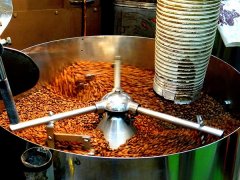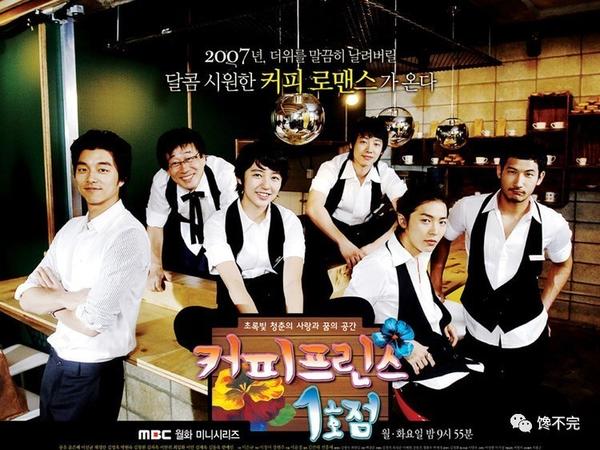The trend of coffee in mainland China is becoming more and more popular. Taiwan is an important driver.

For professional baristas, please follow the coffee workshop (Wechat official account cafe_style)
Taiwan has won the top three coffee-related world competitions, including: 2016 World Cup coffee master champion Wu Zelin, 2014 World Cup baking bean competition champion Lai Yuquan, 2014 World Cup coffee cup test champion Liu Bangyu, 2016 World Cup coffee brewing competition third place Wang ze and others. Several baristas in Shanghai said that "the promotion of the mainland coffee industry is influenced by Taiwan".
Coffee competitions have played an important role in promoting the coffee industry in the boutique coffee industry, which focuses on certification, grading and craftsmanship, the Central News Agency reported. In the mainland coffee circle, Taiwan is fond of talking about Taiwan's award-winning record. for them, Taiwan represents longer coffee development experience, better coffee talent and technology. A number of baristas in Shanghai said that many of them had been trained as baristas in Taiwan and knew a lot about Taiwan's coffee experts.
Shanghai is the most prosperous place of cafe culture in the whole mainland. Wang Xiaofeng, the owner of Moon Coffee, a well-known independent coffee circle in Shanghai, said that the culture of fine coffee was not so popular three years ago, and the cafes opened by Taiwanese were "pure" and "quality shops", billed as self-baked boutique beans, opening up new horizons for the Shanghai consumer group, which was dominated by Starbucks at that time.
Taiwanese have repeatedly made great achievements on the stage of the world coffee competition, and the mainland coffee industry is also very concerned about this. The picture shows the cover of the coffee-related magazine featuring the 2016 World Cup coffee master champion Wu Zelin. (
When several mainland baristas get together and talk about their career, they will certainly mention well-known baristas who have been taught from Taiwan, such as Hu Yuanzheng, who served as the referee of many coffee competitions in the World Cup, Lim Dong-Won, who is known as the "Prince of Coffee Laddies," and Huang Junhao, who once served as the first coffee manager of the quality store. They have their own cafes, coffee companies or coffee training institutions on the mainland, and continue to spread their influence through itinerant lectures in professional fields. Lim Dong-Won, who first came into contact with the mainland coffee industry in 2005, said, "many of the students I studied with are now bosses of coffee companies."
Taiwanese have a wide range of coffee businesses in the mainland. As early as 1997, Shangdao Coffee entered the mainland and introduced the business model of "coffee plus western food". After that, more than 100 Shangdao coffee stores changed their name to "cross-strait coffee" in 2003 and continued to expand their stores in inland areas. In addition to cafes, Taiwanese businessmen also run baking factories and import raw beans. Wang Li Coffee, which entered the mainland in 2003, not only sells equipment and imported boutique coffee beans, but also provides tutoring service for opening stores. The model of coffee chains such as Shangdao may seem old-fashioned for the younger generation who dream of opening their own coffee shop, but Taipei's diverse independent coffee shops still appeal to them.
Zheng Songmao, former chairman of ideology Advertising Company, opened a coffee shop in Shanghai, which has trained a lot of coffee talents for Shanghai and other cities. He believes that baristas are not just a job, this major also gives practitioners confidence and dignity.
Wang Xiaofeng has not been to Taiwan yet, but over the past few years in this circle, she knows that Taiwan has a good source of raw beans, and she also feels that Taiwan's coffee industry is highly mature, so she wants to see the operation of Taiwan's boutique cafes and communicate with roasters here.
The influence of Taiwanese on the mainland coffee industry lies not only in the introduction of "how to make a good cup of coffee," but also in the cultivation of talents and the spread of their way of life. Take the quality store as an example, baristas trained over the years have spread their branches in Shanghai and surrounding cities, and many of them have become independent coffee shop operators. Zheng Songmao, the boss who founded the ideological advertising company, left a classic in the eyes of the audience with his unique Stima gum advertisement in the 1980s.
With many foreigners, Shanghai has always been a relatively open commercial city, which makes Shanghai have the most prosperous coffee culture in Chinese mainland.
Zheng Songmao says that many young people who come to be baristas are not highly educated, but through training, they can professionally serve customers at the boss level and even introduce what kind of coffee they should drink. "baristas are not just a job." it also gives them dignity and self-confidence. According to the latest system of the "quality Center", baristas are set to a three-tier system with salaries of 4800 yuan, 5800 yuan and 8800 yuan respectively. They can be upgraded by completing training and examinations. Some baristas are sure of this, because the treatment of baristas in the mainland is still on the low side. However, at present, no one in the "quality library" has reached the highest level. ◇
Important Notice :
前街咖啡 FrontStreet Coffee has moved to new addredd:
FrontStreet Coffee Address: 315,Donghua East Road,GuangZhou
Tel:020 38364473
- Prev

Coffee Culture in Japan-- the History of hand-made Coffee and Cafe
Exchange of professional baristas Please follow the Coffee Workshop (Wechat official account cafe_style) when in Tokyo, I like to stop in different corners of the city and sit in the coffee shop around the street for a while, such as gallery to Genzu in Nanqingshan, Dafang cafe that comes out of the subway station, and Caf de Lambre when shopping in Ginza. The pace of life is extreme.
- Next

Coffee and Prejudice-- on Coffee Culture in Korea
Professional baristas Please follow the Coffee Workshop (official Wechat account cafe_style) Coffee, one of the three drinks in the world, is made from roasted coffee beans. Together with cocoa and tea, they are the most popular drinks in the world. The word coffee comes from the Greek word Kaweh, which means strength and enthusiasm. As an important drink for Europeans, it has been integrated with life style.
Related
- How did the Salvadoran coffee industry develop in Central America?
- What exactly does the golden cup extraction of coffee mean?
- The Origin of Coffee flower
- [2023 Starbucks World Earth Day] there are more meaningful things besides free Starbucks coffee!
- What kind of coffee is there in Spain? 9 Flavors of Spanish Coffee
- Aromatic African coffee| Kenya's coffee culture and historical production area
- Liberica Coffee Bean knowledge: the characteristics of Liberian Coffee beans of the three original species of Coffee beans
- The origin and formula of Spanish latte introduces the taste characteristics of Bombon coffee in Valencia, Spain.
- How to adjust the solution of over-extracted coffee
- What is the tasting period of coffee beans? What is the period of coffee and beans? How should coffee wake up and raise beans?

